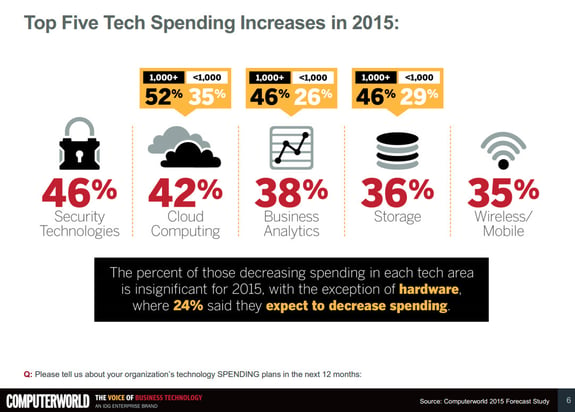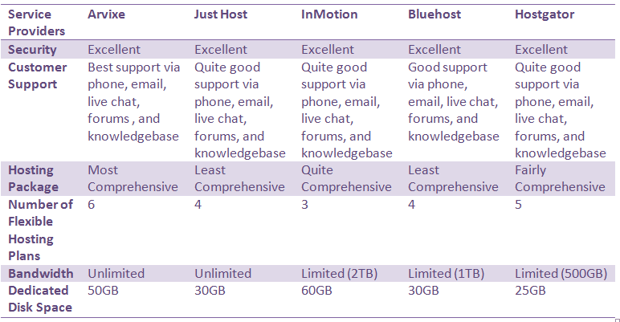Has your organization already started hosting services on the cloud platform? If no, then you probably need to know about the fast pace at which cloud computing is being adopted by firms across the globe. A big shift towards cloud computing has been further evident as per the cloud spending estimates made by the analyst house IDC for 2015. The cloud-based expenditure by enterprises was estimated at around $26.4 billion for 2014 and, according to the IDC, the total cloud infrastructure related expenses will rise to about $32 billion in 2015. That is a significant 28% increment in cloud spending. In fact, as per the ComputerWorld forecast study conducted in 2015, it is expected that around 42% of the IT decision makers are planning to increase the spending related to cloud platforms, which is the second highest spending category for IT enterprises after security technologies. 
Source: Forbes So let's try and understand the concept of cloud hosting and its advantages as well as compare cloud hosting services with traditional web hosting services.
What is Cloud Hosting?
It involves hosting services for websites by configuring servers in a flexible way to provide an extremely reliable, scalable and affordable web infrastructure.
 Image credit: Flickr
Image credit: Flickr
It is a service rather than a product which hosts websites on virtual servers that eventually utilize the computing resources from the underlying networks of physical web servers. This network of servers is often pulled together from various data centers situated across different locations. Cloud computing is based on any of the services, such as Software as a Service (SaaS), Platform as a Service (PaaS), Hardware as a Service (HaaS), Infrastructure as a Service (IaaS) and Everything as a Service (EaaS).
Cloud Hosting versus Traditional Web Hosting
In case of shared web hosting, your website does not get all the resources of the single dedicated server for its own usage. Instead, it shares them with websites of other users who have opted for the shared server. If any website causes overload on the single shared server, all the other websites may also face slowdown or downtime. If you opt for cloud hosting, your website gets hosted on a network of servers and you do not depend on a single server. So, even if one of the servers gets overloaded, your site will continue to function normally without any downtime due to the presence of other less loaded servers (which serve as a backup for the overloaded server) within the network. With cloud hosting, your website gets access to any of the available resources from within the network of servers.
If you use a Virtual Private Server (VPS) hosting, then your website is allocated a guaranteed amount of resources and there is no flexibility for usage of any allocated resources of other websites that may be free. With cloud servers, you only need to pay for what you use, depending on the demands of your website. Thus, cloud hosting is cost-effective. This is not the case with dedicated hosting, where you continue to pay for the full hosting package irrespective of whether you are using all or only a part of it.
Benefits of Cloud Hosting
- It offers more reliability with better availability of your website so that even if a single data center goes down, your site which is hosted on a cloud can still run smoothly as resources get pulled from servers located across different data centers in different places. Thus, the downtime risk is minimal.
- It has easy scalability for your website for access to additional resources on demand due to a sudden surge in visitor traffic.
- It is quite affordable, as you do not pay for additional free resources that may be unused by your website.
- There are secure physical servers within the different data centers that implement several security measures for appropriate protection and monitoring of the servers.
Selecting an Appropriate Cloud Hosting Provider
- Check out the Service Level Agreement (SLA) of the hosting provider in detail for appropriate technical support guarantees, such as fixing any issue within a fixed number of working hours from the time it is raised. You also need to assess the SLA contract for an acceptable uptime guarantee for your website and appropriate downtime resolution time.
- Look for a provider with a well-managed accounting system in place for timely reporting, billing and accounting activities, since you will be paying only for the resources you use. Verify with existing customers of the cloud provider for any hidden costs.
- Ensure there is proper access to an extensive set of online help tutorials or FAQs for cloud hosting, a support community or forum, and instant access to cloud experts who could help you out with any cloud-related issues for your company.
Comparison of the Top Cloud Hosting Service Providers
Here is the comparison of some of the popular cloud hosting service providers:  You can take the above-listed considerations and the comparison into consideration to select an appropriate cloud hosting plan for your business. Having prior experience in the implementation of cloud hosting and its management for various types of businesses, we realize professional expertise always helps in your cloud hosting setup and maintenance. So what are you waiting for? Get in touch with an experienced cloud hosting solutions consultant and move your enterprise to the cloud today! We hope the information shared here helps you enjoy a seamless transition to cloud hosting.
You can take the above-listed considerations and the comparison into consideration to select an appropriate cloud hosting plan for your business. Having prior experience in the implementation of cloud hosting and its management for various types of businesses, we realize professional expertise always helps in your cloud hosting setup and maintenance. So what are you waiting for? Get in touch with an experienced cloud hosting solutions consultant and move your enterprise to the cloud today! We hope the information shared here helps you enjoy a seamless transition to cloud hosting.



























